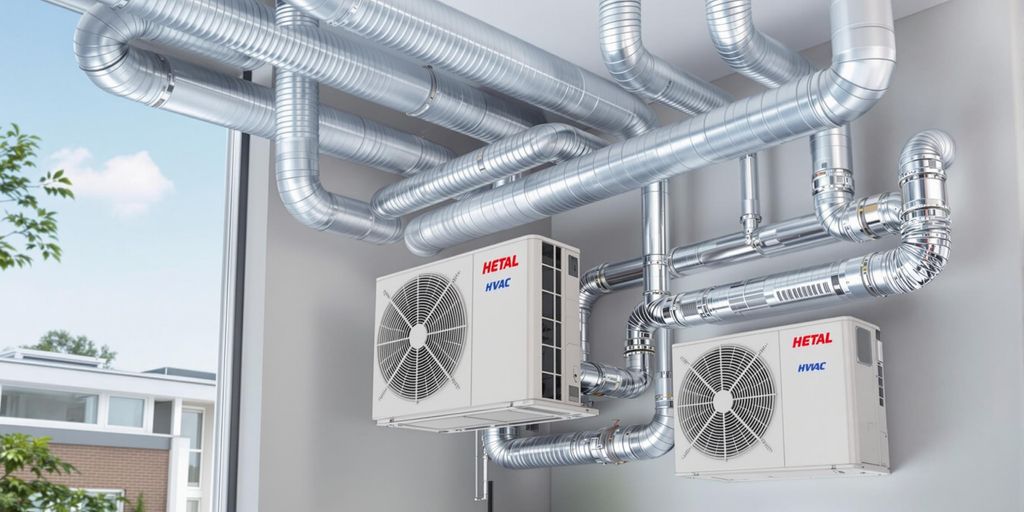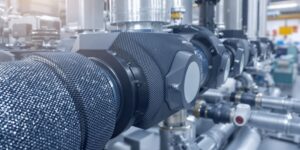Picking the right HVAC system for your home can be a bit of a puzzle. You want something that keeps you comfy, doesn’t drain your wallet, and maybe even helps the planet a little. With so many options out there, it can feel overwhelming. But don’t worry! This guide breaks it all down for you, so you can make a choice that fits your home and your needs perfectly.
Key Takeaways
- Understand the different types of residential HVAC systems like central air, ductless mini-splits, and heat pumps.
- Consider your local climate, home size, and layout when choosing an HVAC system.
- Energy efficiency ratings like SEER and HSPF can save you money in the long run.
- Regular maintenance is key to keeping your HVAC system running smoothly.
- Smart technology can enhance your HVAC system with features like remote control and automation.
Understanding Residential HVAC Systems
Types of HVAC Systems
When you’re looking into components and functioning of HVAC systems, it’s important to know that there are several types to consider. Each has its own way of keeping your home comfortable:
- Central Air Conditioning Systems: These are the most common and are great for cooling large areas. They use a network of ducts to distribute air throughout the house.
- Ductless Mini-Split Systems: Perfect for homes without ductwork, these systems allow you to control the temperature in individual rooms.
- Heat Pump Systems: These systems are versatile, providing both heating and cooling by transferring heat instead of generating it.
How HVAC Systems Work
HVAC systems are all about moving air around to keep your home at the right temperature. They work by pulling in air, heating or cooling it, and then pushing it back out into your living space. The goal is to maintain a consistent and comfortable environment.
- Air is drawn into the system through return ducts.
- It’s then either heated or cooled depending on the season.
- Finally, the conditioned air is sent back into the rooms through supply ducts.
Benefits of a Well-Designed HVAC System
A well-thought-out HVAC system can make a world of difference in your home:
- Energy Efficiency: Properly designed systems use less energy, saving you money on utility bills.
- Improved Air Quality: They filter out dust, allergens, and other pollutants, making the air healthier to breathe.
- Consistent Comfort: No more hot or cold spots in different parts of your home.
Investing in a good HVAC system isn’t just about comfort—it’s about peace of mind, knowing that your home environment is safe and efficient year-round.
Factors to Consider When Choosing an HVAC System

Climate and Weather Conditions
When picking an HVAC system, the climate and weather in your area play a big role. If you live in a place with harsh winters, you’ll need a system that can handle the cold. On the other hand, if your summers are blazing hot, you’ll want something that can keep you cool. Choosing the right HVAC system involves evaluating your home’s size, energy requirements, and long-term goals. It’s all about finding that balance. Some systems are better for certain climates, so make sure to do your homework.
Home Size and Layout
The size and layout of your home are huge factors in deciding on an HVAC system. A small apartment won’t need the same setup as a sprawling mansion. Think about the number of rooms and how they’re arranged. Open floor plans might need a different approach compared to more traditional layouts. It’s not just about square footage; it’s about how air will flow through your home.
Energy Efficiency Ratings
Energy efficiency is a big deal when it comes to HVAC systems. Look for systems with high SEER (Seasonal Energy Efficiency Ratio) ratings. The higher the SEER rating, the more efficient the system, which means lower energy bills. It’s a win-win situation. Plus, some efficient systems might qualify for rebates or incentives, so check out what’s available. Saving on energy costs is great, but helping the environment? Even better.
Picking the right HVAC system isn’t just about keeping your home comfortable. It’s about making smart choices that fit your lifestyle and budget. Don’t rush the decision—take your time to weigh all the factors.
Comparing Different HVAC System Types
Central Air Conditioning Systems
Central air conditioning systems are popular in many homes, especially those in warmer climates. They work by circulating cool air through a system of supply and return ducts. These systems are efficient in maintaining a consistent temperature throughout the house. One of the biggest advantages of central air systems is their ability to cool large areas effectively. However, they require ductwork, which can be a significant investment if your home doesn’t already have it.
- Pros:
- Efficient cooling for large spaces
- Consistent temperature control
- Can be combined with heating for year-round comfort
- Cons:
- Requires ductwork installation
- Higher initial setup costs
- Potential energy loss through ducts
Ductless Mini-Split Systems
Ductless mini-split systems offer flexibility and are ideal for homes without existing ductwork. These systems consist of an outdoor compressor and one or more indoor air-handling units. They are easy to install and allow for "zoned" cooling, meaning you can control the temperature in individual rooms.
If you’re considering a ductless system, it’s a great choice for older homes or those with specific cooling needs.
- Pros:
- No ductwork needed
- Energy efficient with zoned cooling
- Easy installation
- Cons:
- Can be more expensive per unit
- Aesthetics of indoor units may not appeal to everyone
- Requires regular maintenance of filters
Heat Pump Systems
Heat pump systems are versatile, providing both heating and cooling. They work by transferring heat from one place to another, which makes them highly efficient. In mild climates, a heat pump can be an excellent all-in-one solution for year-round comfort.
- Pros:
- Energy efficient
- Provides heating and cooling
- Environmentally friendly
- Cons:
- Less effective in very cold climates
- Higher upfront costs
- May require auxiliary heating in colder regions
Choosing the right HVAC system for your home depends on various factors, including the climate, the size of your home, and your budget. For more detailed information on these systems, you might want to check out this guide that explains various types of HVAC systems, detailing their functions, advantages, and disadvantages.
Energy Efficiency and Cost Considerations
Understanding SEER and HSPF Ratings
When you’re picking out an HVAC system, two terms you’ll often hear are SEER (Seasonal Energy Efficiency Ratio) and HSPF (Heating Seasonal Performance Factor). These ratings tell you how efficient a system is. The higher the number, the better the efficiency. Think of SEER as the system’s cooling efficiency, while HSPF is all about heating. For anyone living in areas with distinct seasons, keeping an eye on both ratings is smart.
Long-Term Cost Savings
Investing in a high-efficiency HVAC system might seem pricey upfront, but it can save you money in the long run. Here’s why:
- Lower Energy Bills: Efficient systems use less energy, which means you’ll spend less on electricity or gas each month.
- Extended Lifespan: When your system doesn’t have to work as hard, it tends to last longer.
- Fewer Repairs: Efficient systems often have fewer breakdowns, saving you on repair costs.
Choosing an efficient HVAC system isn’t just about saving money; it’s about ensuring comfort in your home while balancing cost and minimizing maintenance.
Incentives and Rebates for Energy-Efficient Systems
To encourage homeowners to go green, many governments and utility companies offer incentives and rebates for energy-efficient HVAC systems. These can help offset the initial cost. When shopping around, check for:
- Federal Tax Credits: Sometimes, you can get a tax break for installing energy-efficient systems.
- State and Local Rebates: These vary by location, so look into what’s available in your area.
- Manufacturer Promotions: Some companies offer discounts or rebates on their high-efficiency models.
By taking advantage of these incentives, you can make your new HVAC system a more affordable investment.
Installation and Maintenance of HVAC Systems
Choosing a Qualified HVAC Contractor
Picking the right person to install your HVAC system is a big deal. You want someone who knows their stuff and won’t leave you with a mess to fix later. Here’s a quick list of what to look for:
- Licensing and Certification: Make sure they have the proper paperwork. A certified contractor is more likely to do a good job.
- Experience: Ask how long they’ve been in the business. More experience usually means better service.
- References and Reviews: Check out what other folks are saying. A contractor with happy customers is a good sign.
Regular Maintenance Tips
Keeping your HVAC system in top shape doesn’t have to be hard. Here are some simple things you can do:
- Change or clean your air filters regularly. This keeps the air flowing smoothly and your system working efficiently.
- Keep vents and registers clean and clear of obstructions.
- Remove debris from around the outdoor unit to ensure it runs properly.
Pro Tip: Scheduling a professional maintenance check once a year can save you money in the long run and help avoid unexpected breakdowns.
Signs Your HVAC System Needs Repair
Sometimes, even with the best care, your system might need a little TLC. Here’s what to watch for:
- Strange noises coming from the unit.
- Uneven heating or cooling in different parts of your home.
- An unexpected increase in your energy bills.
If you notice any of these issues, it might be time to call in a pro. Regular DIY HVAC maintenance can help catch these problems early and keep your system running smoothly.
Smart Technology in Modern HVAC Systems

Benefits of Smart Thermostats
Smart thermostats are changing the way we manage our home environments. These devices allow you to control your home’s temperature from anywhere using your smartphone. Imagine adjusting your home’s temperature while on vacation, ensuring comfort upon your return. They also learn your schedule and preferences, optimizing energy use and reducing waste.
- Remote control via smartphone apps.
- Learning capabilities for personalized comfort.
- Energy usage reports to help you save money.
Integration with Home Automation
Incorporating smart HVAC systems with home automation can make life easier and more efficient. With smart technology, your HVAC system can communicate with other devices in your home. For instance, when you leave the house, your system can automatically adjust to an energy-saving mode. This integration ensures that your home’s climate control is both convenient and cost-effective.
- Syncs with smart home devices like lights and security systems.
- Automates energy-saving settings based on your routine.
- Provides voice control through virtual assistants like Alexa or Google Assistant.
Remote Monitoring and Control
Remote monitoring and control are key features of modern HVAC systems. They allow homeowners to check system performance and receive alerts for maintenance needs or issues. This proactive approach can prevent costly repairs and extend the life of your system.
- Monitor system health from anywhere.
- Receive alerts for maintenance and repairs.
- Adjust settings remotely to ensure optimal performance.
Smart HVAC technology is not just about convenience; it’s about creating a comfortable and efficient living environment. With the ability to control and monitor your system remotely, you can ensure your home is always at the perfect temperature while saving on energy costs.
Incorporating smart air technology into your HVAC system can revolutionize your home’s comfort and efficiency, making it more suitable for modern living.
Improving Indoor Air Quality with HVAC Systems
Importance of Air Filtration
Air filtration is a big deal when it comes to keeping the air in your home clean. A good HVAC system can filter out dust, pollen, and even some bacteria. This means less sneezing and coughing for you and your family. Most systems use filters that need to be changed regularly to keep things running smoothly. It’s like changing the oil in your car—skip it, and things can get messy.
Humidity Control Solutions
Humidity in your home can be a real pain. Too much moisture and you could be dealing with mold; too little and everything feels dry. HVAC systems can help balance this out. They can keep the air just right—not too wet, not too dry. Some systems even come with built-in humidifiers or dehumidifiers. Here’s how they help:
- Prevent mold growth by keeping moisture levels in check.
- Protect your belongings like wood furniture and musical instruments from damage.
- Improve comfort by reducing stuffiness or dryness.
Ventilation Options for Better Air Quality
Ventilation is all about letting fresh air in and pushing stale air out. It’s crucial for maintaining good indoor air quality in any home. HVAC systems can include options like exhaust fans or air exchangers to help with this.
- Exhaust fans: These are great for kitchens and bathrooms to get rid of odors and moisture.
- Air exchangers: These can swap out indoor air with outdoor air, keeping things fresh.
- Natural ventilation: Sometimes, just opening a window can do wonders!
Keeping your home’s air clean isn’t just about comfort—it’s about health. A good HVAC system makes sure your air is as fresh as possible, reducing allergens and pollutants. So, breathe easy knowing your system has got your back.
Wrapping It Up
So, there you have it. Picking the right HVAC system for your home isn’t just about grabbing the first one you see. It’s about thinking through what you really need. Consider your home’s size, your budget, and how much you care about energy efficiency. Maybe chat with a pro if you’re feeling stuck. At the end of the day, you want something that keeps you comfy without breaking the bank. And remember, a little research now can save you a lot of headaches later. Good luck with your choice!
Frequently Asked Questions
What is an HVAC system?
An HVAC system is a setup in your home that helps control the temperature and air quality. It stands for Heating, Ventilation, and Air Conditioning.
How do I know which HVAC system is right for my home?
To pick the right HVAC system, think about your local weather, the size of your home, and how energy-efficient the system is.
What are the different types of HVAC systems?
There are several types of HVAC systems like central air conditioning, ductless mini-splits, and heat pumps. Each has its own pros and cons.
Why is energy efficiency important in HVAC systems?
Energy efficiency means the system uses less power to do the same job, which can save you money on your energy bills and help the environment.
How often should I maintain my HVAC system?
You should check your HVAC system at least once a year to make sure it runs well. Regular maintenance can prevent bigger problems later.
What are smart thermostats and how do they work?
Smart thermostats let you control your home’s temperature from your phone or computer. They can learn your schedule and help save energy.




